The month of October is known as the international "Pink Month", because it is the month designated to raise awareness of the need for the early detection of breast cancer, the most common type of cancer, according to the World Health Organization, and the number one cause of cancer deaths among women. Nearly 685,000 women died in 2020 as a result of this disease, and one in 12 women are infected with it.
The World Health Organization is working to reduce the global mortality rate of this disease by 2.5% annually, that is, avoiding 2.5 million deaths from the disease between 2020 and 2040. The organization is using health education to promote early diagnosis of the disease and comprehensive treatment, supported by health and social institutions and humanitarian organizations all around the world.
In Lebanon, the situation is no different, but the challenges are compounded by the increasing severity of the economic crisis and the loss of medicines, two problems that all groups suffer from, whether we are talking about the Lebanese people or refugees from different countries. And several organizations are working to address them with the available means.
The challenges are compounded in Lebanon to tackle breast cancer with the increasing severity of the economic crisis and the loss of medicines
Stories of Lebanese and Syrian women with "that disease"
Um Hussein, a Lebanese 52-year-old woman, tells of her mother's experience with breast cancer. "Every time I remember my mother's suffering, especially during the final stages before her death, and the loss of her hair, I can't even describe my pain and sadness. I feel mental exhaustion, and feel overcome with the need to tell her story so that women become aware of the need for early screening and periodic follow-up, whether they are single, married, or mothers. We need to get enough information and have regular check-ups and x-rays."
Um Hussein recounts to Raseef22, "We found out about my mother's illness six years after she had actually gotten it. She was nearly 76 years old. We noticed a change and atrophy in her nipple. We took her to a specialist who performed an operation to remove it, but six months later the lumps reappeared, the sores increased, and the journey of chemotherapy began. The medications were very expensive and we could not secure them on a regular basis, which caused her health condition to deteriorate. We sometimes got medicines from the Ministry of Health, and then they were cut off during other time periods, so my mother's condition worsened and the rate of infections in her wound increased."
After her mother passed away, Um Hussein had misgivings, "I became afraid of getting this disease, and I feel that I, along with my sisters, should get the x-ray done every year. I also refrained from eating sweets and sugars, after the doctor explained to us that sugar is the food of cancer."
"Every time I remember my mother's suffering, especially in the final stages before her death, I feel the need to tell her story so that women are aware of the need for early screening and periodic follow-up, whether they're single, married, or mothers. We need to learn more"
Jawaher Assaf, 44, a Syrian refugee in camp 019 in Bekaa's Saadnayel, also recounts her suffering. "I discovered my illness when I was 39 years old. I have four sons, and 13 years ago, I refrained from getting pregnant. Years ago, the International Medical Corps (IMC) team organized an awareness session in our camp, and I noticed that I was experiencing the symptoms they were talking about. I did the x-ray and medical tests, and they did not show my disease. It was the biopsy that revealed the presence of cancer. I had three operations performed on me to remove the lumps, and in the last one, half of the breast was removed. I currently need a new operation, but I cannot do it, and there are no centers or organizations that support completing the treatment."
Jawaher received some financial support and medication from the Endless Medical Advantage organization, which visits the camp on a regular basis, and for some time, has been organizing awareness sessions on the need for early detection, according to her.
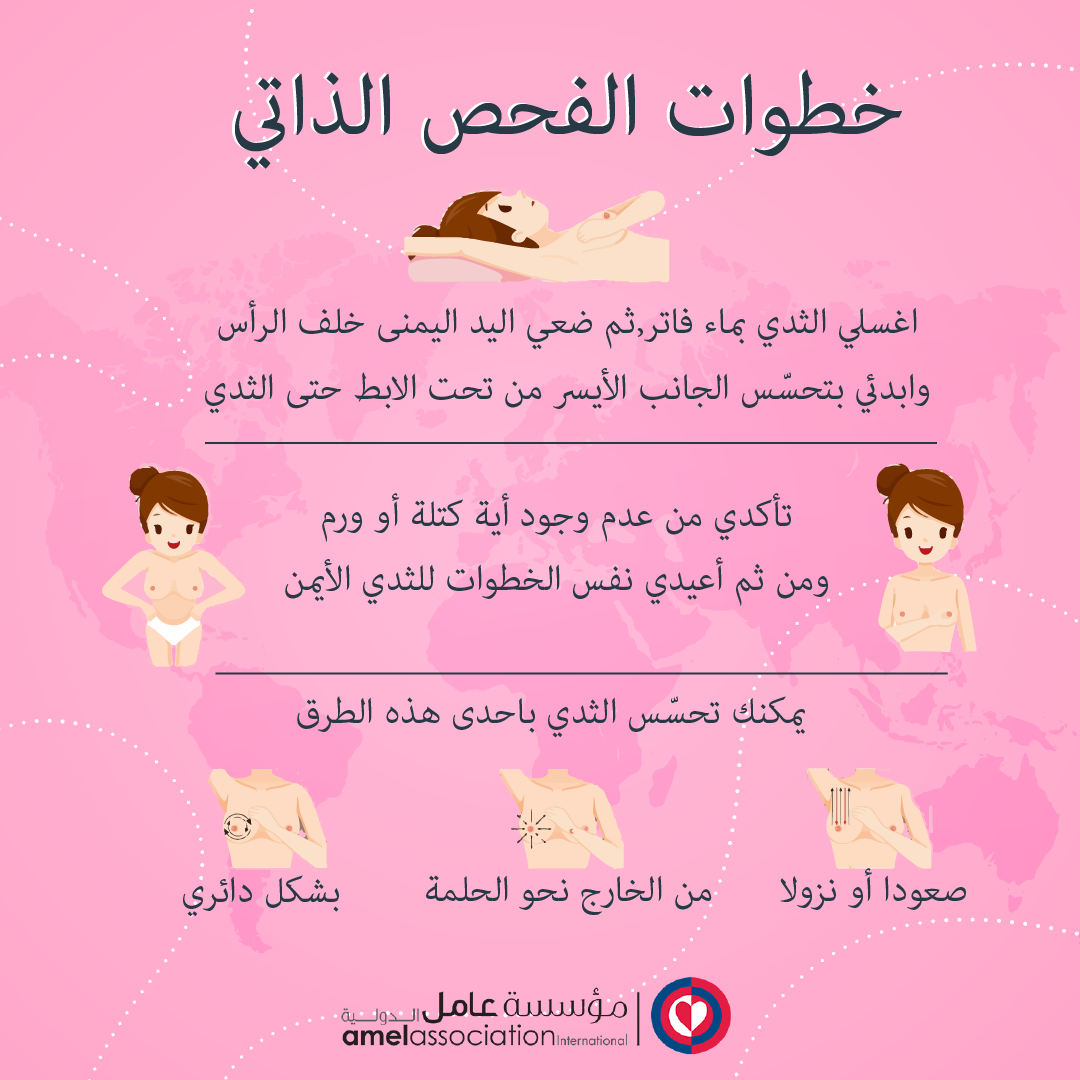
A breast self-exam as published by the Amel International Association
"So we won't regret"
Nawal Fares, a Syrian nurse and a volunteer in the Breast Cancer Surgical Clinic department at the Ghiras Al Kheir Clinics in the Bekaa town of Zahle, says, "I joined this field four years ago and registered to pursue my studies in nursing in accordance with my mother's wishes, may God have mercy on her soul. She got breast cancer and I did not have any information about this disease at the time because of our circumstances in the war, our asylum, and our poor financial situation."
Nawal volunteered in this department after she was unable to heal her mother's ailment. "My mother pushed me to help others. She passed away but I have continued on my path in cancer awareness. I don't want us to lose more women and mothers."
Nawal helps the women overcome their fear of getting the disease, noting that the doctors at the center discover cancerous cases on a daily basis, and this is something that worries her, especially since the center is unable to cover the costs of treating all the cases. "I give advice to all the ladies who come to the center for the x-ray. I just don't want them to ever say, 'If only'."
Services in the Bekaa region
Widad al-Atrash, a social worker at the Amel International Association in the border town of Arsal, receives any and all calls to her number (76 172 674) from women in the town who want to benefit from their early detection service on breast cancer, whether they're Syrian or Lebanese, as long as their ages are over 35 years. She works on securing transportation between their places of residence and the medical centers.
Also in the town, the center for "Primary Health Care in Ersal", supported by the "Al-Ameen for Humanitarian Support" organization, provides its health services in this regard. The services include awareness sessions inside the center, in refugee camps, and within residential communities, targeting women who attend in order to obtain medical care. The center also has a mammogram machine that performs free x-rays for all women, with doctors following up on their cases, and guiding them in case they need additional tests or are suspected of having cancerous clusters, in addition to providing medicines for free. However, it does not cover cases that require treatment and hospitalization in case the patient needs doses (of chemotherapy) or the like, according to what some of those benefiting from the services have informed Raseef22.
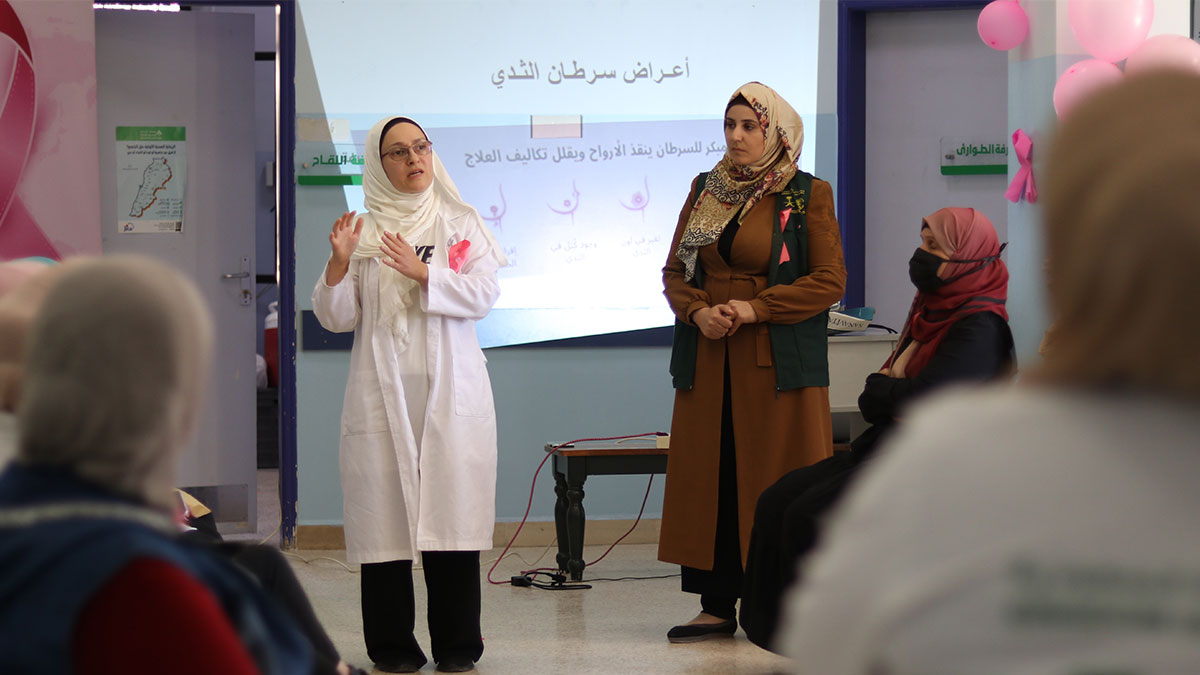
Throughout the year, the Ghiras Al Kheir medical center in the town of Majdal Anjar provides x-ray services to women almost free of charge, according to Dr. Mohamad Maiber, director of the center. Meanwhile Ihsan Hammoud, director of the Amel Association in the town of Kamed el-Loz in the West Bekaa, continues her work in managing the breast image campaign for women in the region. She tells Raseef22, "We are working to raise awareness, both within the center and in the surrounding towns, such as Jeb Jannine, Ghazze, Mansourah, Dakwa, Sweiri, Manara, Rafid, Dahr al-Ahmar and Rashaya. We started doing mammograms for the women, and we are working to secure transportation for them to come to the center and return to their places of residence."
She continues, "We receive a large number of women from different regions, and we give priority to those over the age of thirty, and those in urgent need to have the mammogram done, especially if symptoms of the disease are suspected. We have published the contact numbers (08 663 086 - 03 814 903) on a wide scale so that any woman can access these services. Amel Association centers across Lebanon are offering the same services, in addition to our social and health role in raising awareness on reproductive health and mobile clinics."
Services in Tripoli and Akkar
In Akkar, the Al-Amir Medical Center in the town of Barqayel had provided free x-ray services to one hundred women over the age of forty, between the twenty-fourth and twenty-ninth of October. The center can be contacted on 70 772 454.
"The procedures we are currently doing, through a team of volunteers, include raising awareness on breast cancer health and referring women over the age of forty to the centers we collaborate with to perform x-rays"
Social activists shared a picture under the title "Healthcare centers that support mammograms" on social media, and the list includes:
In Akkar: Kfartun Center, Advanced Medical Center - Mashta Hassan (06 800 561), Al-Bireh Social Health Center (06 830 664), Tanmiya Medical Center - Khriabet Al-Jundi (06 696 966), Telmeayan Governmental Center (06 810 499), Al-Iman Medical Center - Bebnin (06 471 303), and Al-Amir Medical Center Berqayel (70 772 454).
In Tripoli: Al-Iman Health Center - Mina (06 211 770), Al-Ikhlas Center - Abu Ali Roundabout (06 394 610), Rahma Hospital - Abi Samra (81 499 434), Al-Nahda Center - Beddawi (06 387 755), and Waqf Medical Center - Al-Qobba (06 382 010).
In Miniyeh-Danniyeh: ِAl-Iman Center - Danniyeh (06 490 149), and Al-Nahda Center - Miniyeh (06 463 481).
Qamar, a volunteer at the International Medical Corps in Tripoli, reports that throughout the year, the IMC provides educational sessions for different age and community groups and in various regions and towns in Lebanon, including awareness on all diseases. It stresses the need for early detection of breast cancer, in addition to referring women who need a mammogram to health centers cooperating with the IMC in each region.
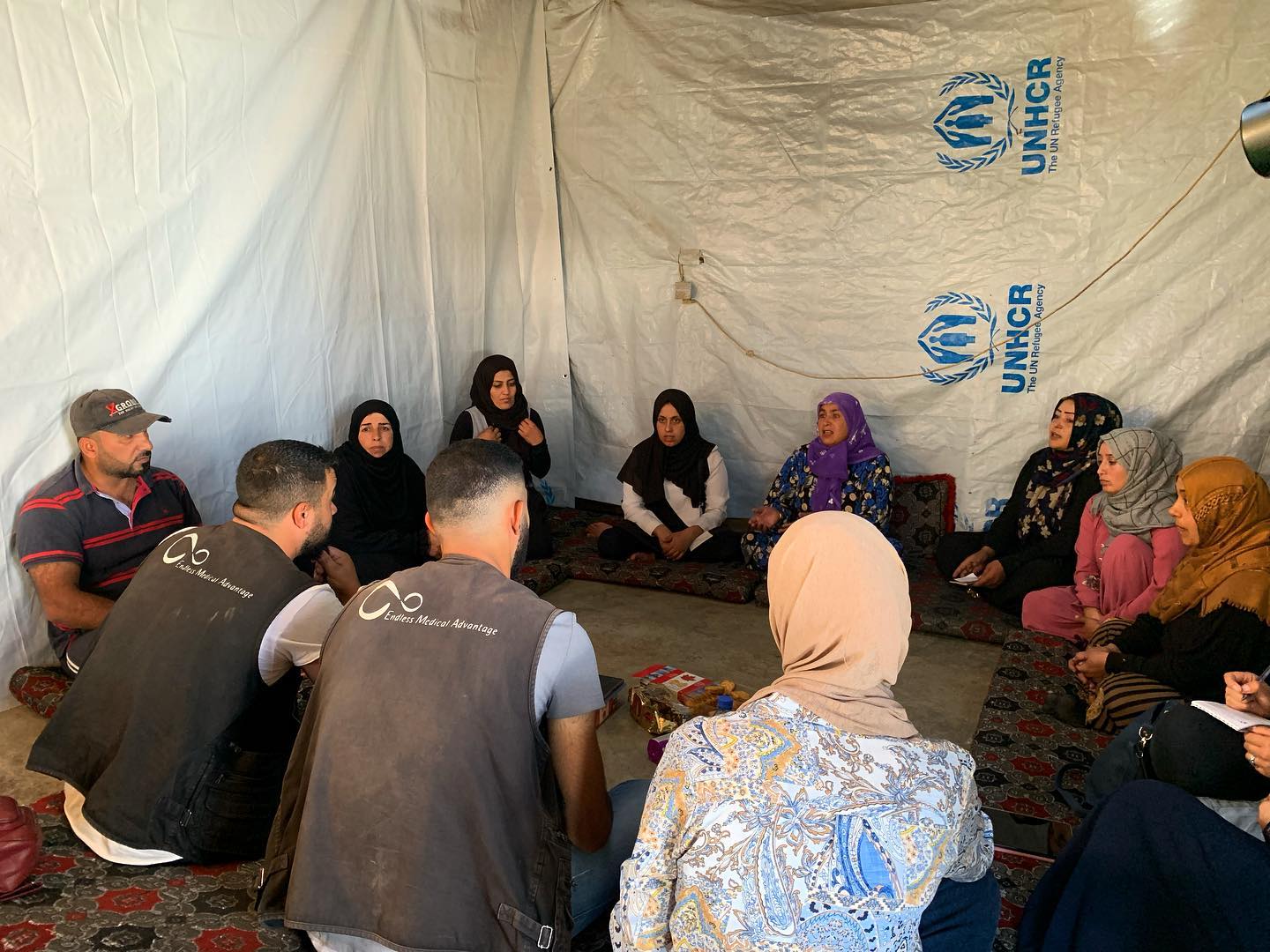
In the capital and the South
Muhannad al-Ahmad, who is responsible for the team working in the Community Health Department with the UNHCR, says, "The procedures we are currently doing, through a team of volunteers, include raising awareness on breast cancer health and referring women over the age of forty to the centers we collaborate with to perform x-rays. Accordingly, these women can go to health centers in Beirut and undergo the examination free of charge. We target the families that are most in need and based on the woman's condition." He stresses that the service is free of charge and available as soon as you contact the team via the number (81 776 609).
The Lebanese Order of Midwives (LOM) or also provides support and aid in awareness and education campaigns to prevent breast cancer, and can be reached at the number (78 86 234).
Widespread media campaigns in the media play a role, albeit limited, in treating the disease or catching it early
In the south, centers of the Amel International Association organize awareness campaigns, and the HHUMC Hammoud Hospital in Sidon offers a 50% discount on mammograms. The Al-Moawasat Association posts on social media on how to conduct self-exams to raise further awareness.
Widespread campaigns in the media — including a pink ribbon with slogans such as "Early detection and treatment in the early stages enhance the chances of a full recovery. Don't wait for symptoms. Check now. With early detection, save your life" — play a role, albeit limited, in the treatment of the disease or catching it early. They draw the attention of some women to the need for early detection in breast cancer, and that they must go to places that provide medical examination and receive treatment.
However, the loss of medication, the high costs of hospitalization, and the withdrawal of the Ministry of Health from its supporting role, have put all women in Lebanon in an unequal confrontation with this deadly disease. Some organizations are seeking to fill the resulting vacuum, and provide awareness and treatment intervention, despite the modest capabilities available, hoping to reduce the incidence of this disease, which in 2020 amounted to about 40% of women's cancer cases in the country.
Raseef22 is a not for profit entity. Our focus is on quality journalism. Every contribution to the NasRaseef membership goes directly towards journalism production. We stand independent, not accepting corporate sponsorships, sponsored content or political funding.
Support our mission to keep Raseef22 available to all readers by clicking here!
Interested in writing with us? Check our pitch process here!
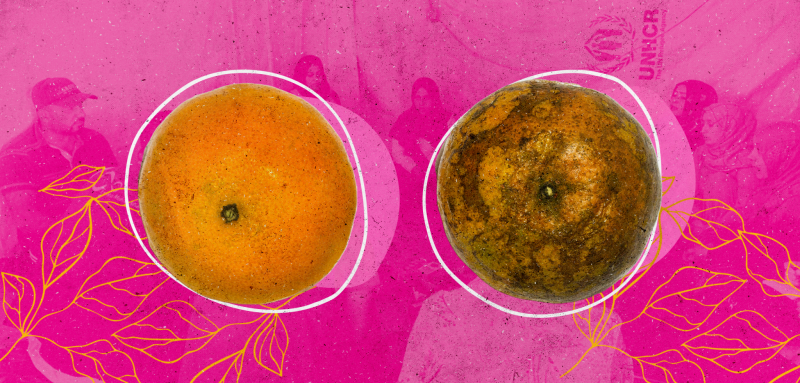
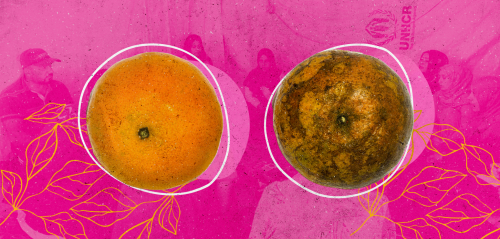
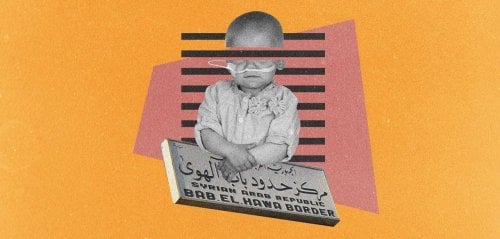
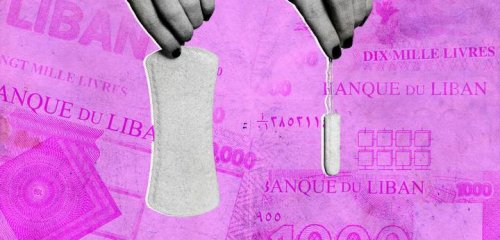
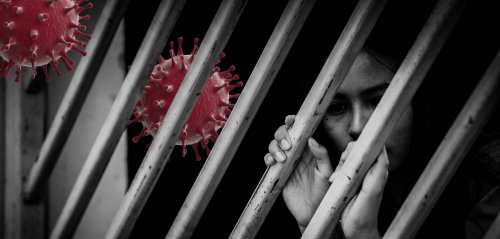





Join the Conversation
Ghina Hashem -
10 hours agoالحب حرام بس اعلامهم يلي ماجابت للبلد الا الدمار معليش يرفعوها نحنى محاربون في الشرق الاوسط كافة
ذوالفقار عباس -
1 day agoا
Hossam Sami -
1 day agoصعود "أحزاب اليمين" نتيجة طبيعية جداً لرفض البعض; وعددهم ليس بالقليل أبداً. لفكرة الإندماج بل...
Anonymous user -
3 days agoرائع و عظيم ..
جيسيكا ملو فالنتاين -
1 week agoزاوية الموضوع لطيفة وتستحق التفكير إلا أنك حجبت عن المرأة أدوارا مهمة تلعبها في العائلة والمجتمع...
Bosaina Sharba -
1 week agoحلو الAudio
شكرا لالكن